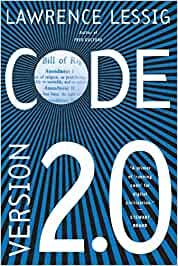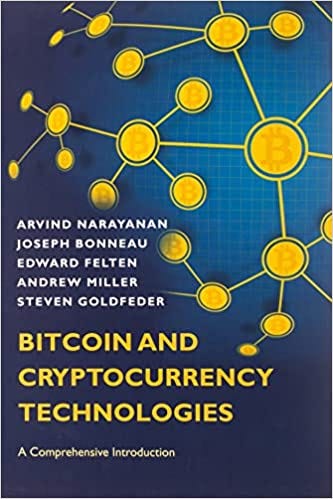The Best Books on Crypto
Books that every crypto-interested individual should read, organized by category.
Updated August 13, 2022 - added a section on Code & Technical Documentation and new, highly recommended books (marked by *).
“Inaction breeds doubt and fear. Action breeds confidence and courage. If you want to conquer the negative elements in your life, don’t sit at home and think about it. Go out and get busy!” - Dale Carnegie
I know what you're thinking.
Wait a minute, I thought this post was about books for crypto lawyers? What does Dale Carnegie telling me to "get busy" have to do with anything?
You're right. That first sentence wasn’t relevant. And that's the point. There are hundreds of books and thousands of articles, all discussing crypto, all claiming to be the definitive source. Many aren't relevant, and some are dangerously misleading. If you search "Crypto Books" on Google, you get 308,000,000 results.
And another book is (probably) published every 10 minutes. This underscores the importance and value of finding the right sources.
This article provides an overview of the must-read books for those interested in cryptocurrencies, NFTs, DAOs, and other blockchain-based innovations (note: I haven't read them all). Think of this as a living document, subject to change and updates based on your comments and recommendations.
Important Concepts
The Starfish and the Spider: The Unstoppable Power of Leaderless Organizations*
Recommended by both Lewis Cohen and Aaron Wright, this book offers a fascinating pre-bitcoin look at decentralization and is well worth reading for anyone interested in the topic - it explores the hidden power behind the success of Wikipedia, Craigslist, and Skype, and argues that argues that organizations fall into two categories: traditional “spiders,” which have a rigid hierarchy and top-down leadership, and revolutionary “starfish,” which rely on the power of peer relationships.
Working in Public: The Making and Maintenance of Open Source Software*
An inside look at modern open source software developers--and their influence on our online social world. Recommended by both Nelson Rosario and Sydney Abualy, this book provides a great representation of how Open Source software works in the "real world."
The Before Bitcoin* series provides the ideological context of cryptocurrency in a series of posts.
For some entertaining crypto-related fiction (pre-Bitcoin), try Cryptonomicon* by Neal Stephenson. The story revolves around a mission to keep the Nazis ignorant of the fact that Allied Intelligence has cracked the enemy's fabled Enigma code. It is a game, a cryptographic chess match between the two sides that is translated into action by Stephenson.
Understand the Blockchain Ecosystem
Build your basic understanding of the blockchain technology space.
If you don’t understand how this nascent technology works at a very basic level, you’ll struggle to level up your knowledge. It’s like learning calculus before fully understanding addition and subtraction. Baby steps.
Blockchain: Bubble or Revolution - Neel Mehta, Adit Agashe, and Parth Detroja
Written in an easy-to-understand format, this book offers an optimistic yet critical approach to blockchains by balancing the pros and cons in a realistic fashion. It is a popular choice for anyone starting in the space, or further refining their understanding.
The Basics of Bitcoins and Blockchains - Anthony Lewis
Lewis explains the technology in a clear and structured way to provide a readable introduction to cryptocurrencies and their implications. By the conclusion, you’ll understand what blockchains are, why they are important, and how they work. If you want to hammer home your understanding of the basics, this is the book for you.
The Bitcoin Standard - Saifedean Ammous
Despite Bitcoin-centric vibes, this book offers a pragmatic review of monetary history and economics, with Bitcoin not covered until Chapter 8. Ammous argues that the gold standard was a superior system to fiat, and that the 'Bitcoin standard' will be its digital reincarnation. Regardless of your personal views, and despite the omission of important aspects (such as the role of debt in the economy), the historical overview of monetary history makes this worth reading.
DeFi and the Future of Finance - Campbell R. Harvey, Ashwin Ramachandran, and Joey Santoro
Provides a clear assessment of how decentralized finance solves many of the problems with the current financial system. Also offers a deep dive into the most innovative DeFi protocols, such as Uniswap and Compound.
The Cryptopians: Idealism, Greed, Lies, and the Making of the First Big Cryptocurrency Craze by Laura Shin,
Now available! You'll unwittingly receive an education on how blockchains work, as Shin expertly interweaves explanations of the technology within the history of Ethereum. This book is both a story and a guide, and difficult to put down.
Other popular introductory books: The Blockchain and the New Architecture of Trust: the most significant innovation of blockchain is not governmental or even technological but emotional: the creation of a new form of trust, Blockchain Revolution: how blockchain is changing the world, The Truth Machine: high-level discussion of potential blockchain applications, Cryptoassets: key technological concepts for investors, Layered Money: From Gold and Dollars to Bitcoin and Central Bank Digital Currencies: deep dive into the evolution of monetary systems, and Grokking Bitcoin.
Code and Technical Documentation*
An introduction to Solidity (Ethereum's programming language) with simple examples:
https://solidity-by-example.org/
Cryptozombies is a free, open source, interactive code school that teaches you to build games on Ethereum. The course is designed for beginners to Solidity and starts off with the absolute basics. So if you've never coded with Solidity before, don't worry — they'll walk you through step by step.
Additional resources include SmartContract.Engineer, Learn X in Y Minutes: Scenic Programming Language Tours, SolidityDeveloper.com contains Solidity development tutorials, events and a blog for the Ethereum space made for developers from beginner to expert.
Legal Reads
Books on the legal implications of blockchains
Blockchain and the Law: the Rule of Code - Aaron Wright and Primavera De Felipe
Wright and De Felipe explore lex cryptographia, building on an article they published in 2015. The book investigates a new kind of law, and how blockchains interact with the current legal system. It is a helpful overview of the legal landscape surrounding blockchains, touching everything from DAOs to NFTs, and much more. They also critically evaluated the downsides of decentralized, immutable systems, and attempt to address them. While the space has evolved since this book was published, it is a must for any interested legal mind.
Digital Assets and Blockchain Technology: US Law and Regulation - Daniel T. Stabile, Kimberly A. Prior and Andrew M. Hinkes
This textbook examines the legal and regulatory approaches taken by US regulators in their attempts to address digital assets and related technology. The authors explore the efforts to apply securities laws and money transmission regulation, the growth of smart contracts, the taxation of digital assets, and the intersection of digital assets and criminal law.
Code and Other Laws of Cyberspace - Lawrence Lessig
A 1999 book on the structure and nature of regulation of the Internet, particularly for those interested in questions about law and how the law relates to computerized network systems. Filled with examples of failed attempts to address cyberspace issues, such as the 1996 Communications Decency Act, the central theme is that the architecture of cyberspace can be coded to address issues related to free speech, intellectual property, and privacy. Essentially, Lessig argues that code is law.
The Company: A Short History of a Revolutionary Idea by John Micklethwait. I was first introduced to this book during my interview with Sina Kian on the Law of Code Podcast. Per reviews: "The Company" not only explains the historical arguments that have been front and center of the debate about the role that companies should play, but it also captures the timeless forces that have shaped, and are likely to keep shaping, the debate in the future. If you're at all interested in the history of limited liability, how companies grew exponentially, or democracy itself, this is a must-read.
Governing the Commons: The Evolution of Institutions for Collective Action by Elinor Ostrom. How communities and organizations can successfully govern themselves without formal legal enforcement at their foundation.
Blockchain + Antitrust: The Decentralization Formula by Thibault Schrepel is an open-access book exploring the relationship between blockchain and antitrust, highlighting the mutual benefits that stem from cooperation between the two and providing a unique perspective on how law and technology could cooperate.
Erich Dylus put together an incredible repository of open source templates, forms, writings and other linked materials for DAOs, devs, and incentive programmers - you can find it at his Github page here.*
Interesting Stories & Collections
The Book of Satoshi is a collection of the Bitcoin Founders' essential writings, including the Bitcoin White Paper. The book also contains Nakamoto's explanation of how Bitcoin works and a chronologically organized collection of emails and online forum posts by Nakamoto.
The Blocksize War provides a chronology of the most significant events during Bitcoin’s blocksize war, which waged from mid 2015 to late 2017.
Digital Gold charts the rise of Bitcoin technology through the eyes of some central characters, including an Argentinian millionaire, a Chinese entrepreneur, the Winklevoss twins, and Satoshi Nakamoto.
Life After Google: The Fall of Big Data and the Rise of the Blockchain Economy explores how we are moving away from a world where all our data is centrally held by technology companies, in favour of our data being held by the individual.
Additional recommendations include: Bitcoin Billionaires: story of the Winklevoss's big bet on crypto and its enormous pay-off, The Blue Pill: a spiritual guide for the past, present, and future of Yearn.Finance, Daylight Robbery: How Tax Shaped Our Past and Will Change Our Future, and The Internet of Money: examines and contextualizes the significance of Bitcoin through a series of talks by Andreas Antonopoulos.
The Opposition
Regardless of whether you agree, it’s critical to understand the arguments against blockchain technology.
Attack of the 50-foot Blockchain - David Gerard
Gerard thinks crypto is a scam and writes like it, interrogating the promises of blockchains in the most skeptical fashion possible. Two main assertions:
1) Current blockchain implementations are all unreliable and even fatally flawed. 2) Bitcoin specifically is a scam, full of cons and fraud, eventually trending to zero.
The Case Against Crypto - Stephen Diehl. Summary of the article's basic arguments: 1) The technology does not solve a real problem. 2) So called “cryptocurrencies” aren’t actually currencies, and cannot fulfil the function of money. 3) The history of private money is one of repeated disasters that destroy public trust. 4) Crypto assets are all unregistered securities.
There aren't many books I found, but other anti-crypto articles include How To Kill Bitcoin by Joe Kelly, NFTs Weren’t Supposed to End Like This by Anil Dash, Paper: Bitcoin, Currencies, and Bubbles by Nassim Taleb.
Technical Books
For those looking to understand cryptography, programming, and blockchain at a more technical level.
Mastering Bitcoin - Andreas M. Antonopoulos
The first two chapters cover Bitcoin at a level approachable to non-programmers, but this is a book for developers. Antonopoulos expertly describes the technical foundations of Bitcoin and other cryptographic currencies. He covers a range of cryptography basics, such as keys and addresses, as well as the data structures, network protocols, and the consensus mechanism underpinning Bitcoin.
Mastering Ethereum: Building Smart Contracts and DApps: If you're looking to get involved in the development side of the Ethereum protocol, Mastering Ethereum is the book for you.
The Blockchain Developer - After introductions to the technology and its structure, the book discusses the process of creating a blockchain, building dApps, and more.
Bitcoin and Cryptocurrency Technologies - By Arvind Narayanan, Joseph Bonneau & 3 others.
Whether you are a student, software developer, tech entrepreneur, or researcher in computer science, this authoritative and self-contained book tells you everything you need to know about the new global money for the Internet age. It offers a technical discussion of blockchains.

Now, you may have added 20+ books to your reading list... but regardless of what books you read, you need to get involved in the space. Join a DAO. Buy an NFT. Stake some crypto. The crypto community is both welcoming and friendly - and offers you the chance to learn from others. It doesn't matter how sharp your axe is if you never cut anything down: interact with the products, buy some crypto, yield farm, try minting an NFT - Go out and get busy!
Thanks for reading! Did I miss any great books? Please comment below.
Subscribe to the Law of Code newsletter:
Thanks to Olta Andoni, Larry Florio, Jason Gottlieb, Jared Franklin and Alex Fagella for their input on the initial list, and Gabe Shapiro, Lewis Cohen, Aaron Wright, Brandon Ferrick & many others for their post-publishing contributions!
Additional books can be found at the following links: 48 Best Cryptocurrency Books, 33 Books To Supercharge Your Crypto Knowledge, The 10 Best Cryptocurrency Books, Cryptocurrency Books (GoodReads).
Did I miss any?



